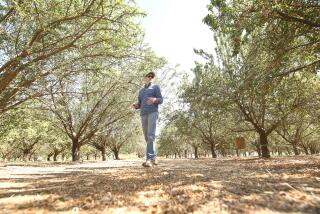Promoting Organic Future : McCarthy Urges Growers to Find Alternatives to Pesticides
California Lt. Gov. Leo T. McCarthy this week called for an expansion of farm research programs that study and promote alternatives to pesticides.
McCarthy said he would like to quadruple the $1.2 million currently spent by the state to develop biological controls, and he vowed to work with the state Legislature and the federal Food and Drug Administration to support programs that encourage organic farming.
âWeâre in the midst of a great deal of controversy in the market,â McCarthy said, referring to the recent consumer scare over Alar-sprayed apples and an escalating public debate over pesticide use and possible health hazards.
âWe want to aggressively seek alternatives to pesticides. . . . Frankly, weâre not doing nearly enough,â McCarthy told Ventura County citrus ranchers at the Limoneira Ranch on Tuesday.
Fact-Finding Tour
McCarthyâs visit to a Santa Paula lemon grove was the fifth stop on a statewide fact-finding mission. In rural areas throughout California, McCarthy is meeting with farmers to discuss alternatives to pesticide use, hear their concerns about pending pesticide laws and collect information about bio-control, which uses beneficial insects to eat harmful ones.
The lieutenant governor praised the assembled Ventura County citrus ranchers--many of whom use a combination of pesticides and biological control to battle insects that threaten their crops.
âYou growers who are using progressive methods; youâre at the cutting edge,â McCarthy said, wearing a tie and seated on a bale of hay.
McCarthy then toured Associates Insectary in Santa Paula, a cooperative formed by growers in 1928 to rear beneficial insects for local farmers. The insect-raising firm each year produces hundreds of millions of bugs that are dumped on 11,000 acres throughout Ventura County and southern Santa Barbara County.
So far, however, only a small percentage of California farmers use biological controls, said Phil Phillips, a pest-management specialist with the University of California extension service.
This is because pesticides offer more financial security to farmers, since they more often result in blemish-free fruit with a high market value. Bio-control works better on certain crops, but with varying levels of efficiency. In some cases, it fails to control enough bugs, leaving too high a percentage of a farmerâs crop cosmetically unfit for market.
But with improved research, a larger array of good bugs from which to choose, and better education, Phillips hopes to convert more and more farmers to bio-control.
For now, much remains unknown about bio-control.
Information Gap
âThereâs this information and data void in discovering new predators,â Phillips said. He said increased research into bio-control would yield new methods of controlling hard-to-kill pests and delicate crops.
Crops such as lettuce pose a special problem, for instance, because a small number of pests can easily damage the leafy crop. And farmers fear that they will lose their market if they offer blemished produce for sale.
âWeâve got to keep that quality up. Itâs a real critical factor and we canât destroy the market,â said Link Leavens, a Ventura citrus rancher.
This is a special concern since 30% of Ventura Countyâs citrus crop is exported to the Far East, especially Japan. Ventura ranchers say the Japanese demand high-quality, unblemished fruit and prefer California citrus to Spanish citrus because of its superior quality.
Some farmers told McCarthy that they fear that consumers have a psychological aversion to blemished produce.
Down the Disposal
âI canât even bring a blemished lemon home to my wife. She puts it right down the garbage disposal,â said David Pommer, a member of the Ventura County Farm Bureau who met with McCarthy on Tuesday.
McCarthy said consumers must be educated through promotional campaigns that blemished produce is still healthy and in fact that blemishes are the aesthetic cost for using fewer pesticides.
To test whether consumers are willing to accept this idea, Phillips is organizing a supermarket survey that will ask consumers to pick between blemished fruit grown with fewer chemicals and blemish-free fruit grown with a higher level of chemicals--both of which are within state-prescribed limits for pesticide traces.
Farmers throughout the state have an added incentive to start using bio-control. A bill pending in the Assembly seeks to ban 13 pesticides that cause cancer and severely restrict another 55 pesticides.
While the pending legislation faces stiff opposition from farm and chemical firm lobbies, state Atty. Gen. John K. Van de Kamp has also proposed an initiative that would incorporate many of the provisions of the Assembly bill.
More to Read
Get the L.A. Times Politics newsletter
Deeply reported insights into legislation, politics and policy from Sacramento, Washington and beyond. In your inbox three times per week.
You may occasionally receive promotional content from the Los Angeles Times.










